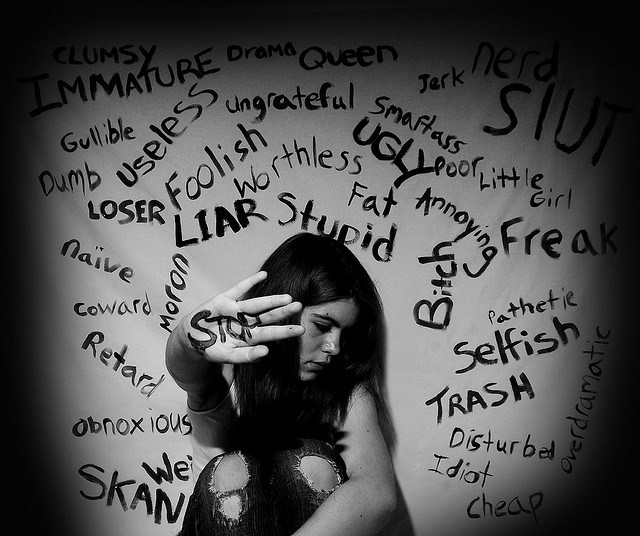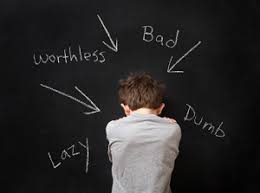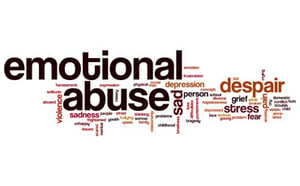
Have you ever felt terrified to tell the truth because you knew that your partner, friend, or parent would react very badly?
Have you felt smothered by your loved one’s controlling behaviors: jealous comments, constant monitoring, or manipulative stories?
Ever found yourself questioning your sanity around one particular person, alternating between waves of shame and feeling numb?
If you answered yes to any of these questions, you might very well have been in an emotionally abusive relationship.
Know that you’re not alone; dysfunctional relationships and substance abuse often go hand in hand.
Read on if you’ve ever thought that addiction and relationships might be connected in your life.
We dive into the true nature of emotional abuse and how to heal. You'll discover:
- Why so many of us minimize the impact of our emotional wounds
- What emotional abuse really is, and the powerful impact it has on our health and well-being
- Three key points to remember for restoring emotional health
- Why healing is possible in the present, no matter what happened in the past
Emotional Abuse: The Unrecognized Epidemic
Emotional abuse is a topic that until recently, our culture didn't really acknowledge and fully understand. We had this understanding of physical abuse, of being hit, but we really didn't have a firm grasp on the significance of abuse that happens with no bruises and no broken bones.
Dr. Marc Lewis' book, The Biology of Desire: Why Addiction is Not a Disease has a chapter in which he talks about Natalie. She was a college student who had been a high achiever but ended up abusing heroin, going to jail, and all of this stuff. Her life really took a downward spiral. Dr. Lewis talked about her realizing that she'd been depressed for most of her life:
"She always thought that it wasn't that bad because she couldn't quite believe that emotional suffering is real suffering, and that it counts."
Emotional abuse does count as real suffering, so it’s important that we talk about how to heal from it, how to move on and recover.
This is what we do: We work with the underlying core issues, which are the mental and emotional wounds, pains, and scars that people have been carrying around for years, unresolved.
What Is Emotional Abuse?
Emotional abuse is anything that's harmful on the heart level, on the emotional level. Mental abuse is harmful on the mental level, physical abuse harmful on the physical level.
You might say, 'Well, that's completely subjective, though, because how would I know what hurts you on the heart level?'
Absolutely, it is a subjective definition.
 Even so, we can look at a couple of behaviors that are recognized as emotionally hurtful to many people. Everyone is different, but there are certain behaviors that we know are shame-based and hurtful on the emotional level for many people.
Even so, we can look at a couple of behaviors that are recognized as emotionally hurtful to many people. Everyone is different, but there are certain behaviors that we know are shame-based and hurtful on the emotional level for many people.
Emotionally abusive behaviors include anything that constitutes psychological aggression, a behavior that's used with the intent to harm.
If you make an offhand comment and then you realize, 'Oh, that could have come off the wrong way,' and, 'I'm really sorry, and I didn't mean it like that’ .... That's very different from a long-term pattern of belittling, gaslighting, name calling, and infantilizing. Emotional abuse is typically repeated patterns of behavior that have a negative impact on you as a person at the heart level.
Emotional Abuse and Addiction
We now know that emotional and mental abuse can be more harmful to our mental health, to our psychology, than physical violence. There have been studies that connect emotional abuse with depression, anxiety, particularly with addiction.
As Leigh Stein noted in her Washington Post essay, He Didn’t Hit Me. It Was Still Abuse:
“Some studies have shown that abuse in the form of degradation, fear and humiliation is more psychologically debilitating in the long term than physical violence; psychological abuse can in fact sustain the relationship, as the victim becomes consumed with self-doubt, depression and low self-esteem.”
When a person feels really hurt and powerless on the emotional level, they're more likely to abuse drugs or alcohol in order to allow them to connect with something, to have some relief.
Dr. Lance Dodes, in his book The Sober Truth talks about this idea of addiction as a way out of helplessness. Often, we think of addiction as simply dysfunctional, or messed up.
To paraphrase, Dr. Dodes effectively says,
“No, actually, the action of using drugs is a fight against powerlessness, because it's a response to a hurt. So someone mistreats you or you mistreat yourself, and then you go for your drug, not as an act of bizarre disconnection, but as this desire to do something about it. It's misguided, maybe, but it's actually proactive.”
How to Heal from Emotional Abuse
There are three main points to remember when healing from emotional abuse.
- First, work with emotional abuse on the emotional level;
- Second, be present in the moment; and
- Third, it's your job to take care of you
Work With Emotional Abuse on the Emotional Level
This sounds really basic, but how many times have you heard someone say, “I just can't wrap my mind around it. How could he lie to me all the time?”
Or, “I can't believe that this person I trusted has been gaslighting me for years. I can't wrap my mind around it.”
That's the idea. You can't wrap your mind around it because it's an emotional level hurt!
You may go to therapy.
You may be talking about it a lot.
You may hash over the details with friends, but until you actually work with that emotional level hurt, you're not going to get to the root of the issue, because that's where the injury occurred. You need to work with the injury on the level of which it occurred.
One key strategy that we use in our non 12-step rehab is called Gestalt. In Gestalt, you talk to a part yourself or to the other person by using an empty chair. In the process, you feel the feelings that are associated with that abuse.

The remarkable thing is when you're in a safe space - when you have emotional support from other people, from a therapist or from a trusted person, from a counselor - then you're able to feel the hurt and the pain, and apply compassion to that hurt and that pain.
Then, you're able to move on.
Often it happens more quickly than you would think, because you're giving the injury the correct medicine. The correct medicine for emotional hurt is compassion, love and care, and kindness. That can be so much more powerful than you ever could imagine.
Remember, work with emotional abuse on the emotional level. Sure, it's important to intellectually understand it, but you're not going to heal if that's where you stop.
Learn How to Be In the Present Moment
The second point to remember when dealing with emotional abuse is to learn how to be in the present moment, and to stay in the present moment.
There's a great quote from Dr. Bessel van der Kolk who's an expert on healing from trauma. He writes, "Healing means bringing the person into the present moment where the danger is gone."
If you're able to stay in the present moment in your real life, right now, and not get stuck in the past where the abuse happened, then you have real potential to be able to heal.
What keeps us in danger is playing these old thought loops and keeping ourselves stuck in the past. The way to feel safe in the present moment is to apply love to the parts of yourself that hurt.
It’s Your Job to Take Care of You
One final point about healing emotional level abuse: It's your job to take care of you.
It may be completely true that someone else consistently and systematically hurt you on an emotional level in the past. You were doing the best that you could at the time when you endured that abuse. But now, it's your job to take good care of you.
It's your job as the adult to make sure that you're in safe situations. If you're in a situation where you feel like this isn't going in a good direction, it's your job to take good care of yourself and to leave.
That is your right.
Be present.
Be loving.
The key point here is: don't abandon yourself.

Often we think that the pain of emotional trauma is that this other person abandoned me, they hurt me, they did all of this. That may be completely true. Yet a lot of our pain actually comes from the ways in which we've abandoned ourselves; the ways in which we didn't take good care of ourselves.
That person might have been the vehicle, but the real pain is, “Oh man, I really left myself. I abandoned myself. I let myself down here.”
The good news is though, that you can repair your relationship with yourself. It doesn't matter what's going on now in your relationship with that other person. They may have passed away. They may not be in your life anymore, but you can repair that relationship with yourself.
You can learn to apply love to the parts of yourself that hurt and repair that connection with yourself. And you don’t have to do it alone.
For more information, download our free eBook, "Healing Underlying Core Issues." You can also call us to discuss your specific situation at 425-275-8600.



